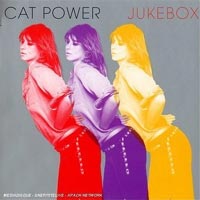It’s somewhat appropriate that Cat Power’s last release on record prior to ‘Jukebox’ was an appearance on the soundtrack to ‘I’m Not There’, Todd Haynes’ recent mesmerising portrait of Dylan in the 60’s and 70’s. Just as Bob/Robert Zimmermann spent much of that period interested in the mechanics of self-mythology and avoiding the constant attempts at being pigeon-holed, so Cat Power/Chan Marshall has over the last eleven-odd years also maintained a healthy interest in both stylistic divergence (from the structurally loose melodies of 1996’s ‘Myra Lee’ to the brassy soul of previous album ‘The Greatest’) and wearing her influences proudly using that great weapon of early folk music, the cover song.
The great shadow of Bob in fact hangs prominently across ‘Jukebox’. As well as her quietly strident interpretation of Dylan’s 1979 ode to Christianity ‘I Believe In You’ is ‘Song To Bobby’, which follows directly afterwards and is, significantly, the only original and brand new track here (a vocal and piano-dominated version of ‘Metal Heart’ excepted). Marshall sings “I’ve always wanted to tell you/But I’ve never had the chance to say it” with all the naïve romance of a newly-discovered love letter, creating a touching four-minutes that manages to make the hero-worship of someone already so ubiquitous and canonised sound revelatory and fresh.
Much in the same vein is the opening track ‘New York’: to open the record with a song so iconic, so synonymous with every drunken wedding reception in history, says volumes for Chan’s belief in her power of interpretation. It’s a wonderfully pessimistic version, and would be almost unrecognisable were it not for the lyrics. This is another rich theme of the album, that credits and context aside the songs within ‘Jukebox’ could conceivably be all born by Marshall’s hand, such is the stylistic unity prevalent within.
A lot of the credit for this must of course lie with Cat Power’s band, including members of Dirty Three and Jon Spencer Blues Explosion. The finger-picked beauty of ‘Silver Stallion’ (originally by the Johnny Cash-featuring Highwayman) and restrained backing on James Brown’s ‘Lost Someone’ are highlights, all the more affecting given Chan’s vocals. Recalling, particularly on ‘Ramblin (Wo)man’, a less abrasive Beth Gibbons, their power lies in the absence of histrionics, whilst simultaneously retaining a drama and crackle that ensures her reading of Billie Holiday and Jessie Mae Hemphill standards are dignified, evocative gems.
Like the other ten tracks on ‘Jukebox’, both ‘Don’t Explain’ and ‘Lord, Help The Poor & Needy’ fade out gracefully near the end, Chan Marshall’s voice suddenly disappearing into the ether. While this is likely the fault of record companies and their draconian fear of leaks, the effect is actually pretty amazing. I like to think it’s intentional, an attempt to further evoke the feel of long-untouched vinyl or a late-night radio station from the troubled American desert of the Coen brothers. This is the world that ‘Jukebox’ so lovingly creates.




































